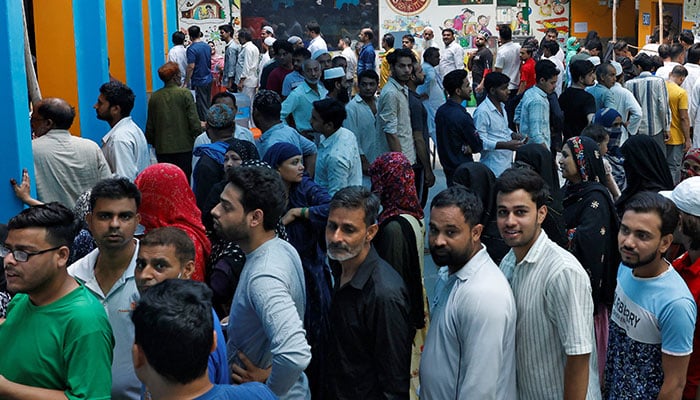New Delhi: Key Indian opposition leader Rahul Gandhi voted on Saturday at the start of the country’s sixth phase of key elections, with Prime Minister Narendra Modi’s rivals accusing his government of unfairly targeting him in a criminal investigation.
Modi, 73, remains deeply popular after a decade in office and his ruling Bharatiya Janata Party (BJP) is widely expected to win a third term next month after polling was affected by a heat wave in early summer.
His chances have been further bolstered by multiple criminal investigations against his opponents, raising concerns over the fairness of the vote among UN rights chief Volker Turk and human rights groups.
Gandhi, the most prominent leader of India’s opposition Congress party, cast her vote at a polling station in New Delhi, where temperatures were forecast to reach 43 degrees Celsius (109 degrees Fahrenheit).
Gandhi, the son, grandson and great-grandson of former prime ministers, stopped for a selfie with his mother Sonia after voting but did not talk to the crowd of journalists.
The scion of a dynasty that dominated Indian politics for decades, he was convicted of criminal defamation last year following a complaint by a member of Modi’s party.
Following his two-year prison sentence he was disqualified from Parliament until the decision was suspended by the High Court.
Delhi Chief Minister and opposition Aam Aadmi Party leader Arvind Kejriwal, 55, who was detained in March in a long-running corruption case, was due to vote later on Saturday.
Earlier this month, the Supreme Court granted Kejriwal bail and he returned to the campaign trail, urging Indians to vote against what he called a nascent “dictatorship.”
Soon after his release he said, “Modi has embarked on a very dangerous mission.” “Modi will send all opposition leaders to jail.”
The Congress is leading the opposition alliance of over two dozen parties contesting jointly against Modi, including the Aam Aadmi Party.
Kejriwal’s organization emerged from the anti-corruption movement a decade ago – its name means Party of the Common Man – and has been elected to office in the Delhi region and Punjab state, but has struggled to establish itself as a nationwide force. Have done.
In February, authorities had frozen several of the Congress’s bank accounts as part of the ongoing dispute over income tax returns filed five years ago, a move Gandhi said had seriously affected the party’s ability to contest elections. .
“We don’t have money to campaign, we can’t support our candidates,” the 53-year-old told reporters in March.
Modi’s political opponents and international rights campaigners have long sounded the alarm over India’s shrinking democratic space.
The US think tank Freedom House said this year that the BJP had “increasingly used government institutions to target political opponents”.
Heatwave ‘red alert’
India is voting in seven phases over six weeks to ease the huge logistical burden of conducting elections in the world’s most populous country.
Turnout was down several percentage points from the last national election in 2019, with analysts attributing this to widespread expectations of a Modi victory as well as warmer-than-average temperatures in the Indian summer.
India’s weather bureau this week issued a heatwave “red alert” for Delhi and surrounding states, where millions of people were voting on Saturday.
The India Meteorological Department has warned of increased health risks for infants, the elderly and people with chronic diseases.
Extensive scientific research shows that climate change is causing heat waves to become longer, more frequent and more intense, with Asia warming faster than the global average.
More than 968 million people are eligible to vote in the Indian election, with the final round of voting taking place on June 1 and results expected three days later.
| Denial of responsibility! Thelocalreport.in is an automatic aggregator around the global media. All the content are available free on Internet. We have just arranged it in one platform for educational purpose only. In each content, the hyperlink to the primary source is specified. All trademarks belong to their rightful owners, all materials to their authors. If you are the owner of the content and do not want us to publish your materials on our website, please contact us.The content will be deleted within 24 hours. |


